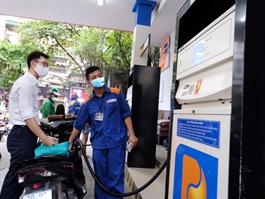Automobile sales down 42 per cent on chip shortage
Automobile sales down 42 per cent on chip shortage
The Vietnam Automobile Manufacturers’ Association (VAMA) has announced that its members sold 25,159 vehicles in June, down 42 per cent from May ending three consecutive months of gains.

Businesses blamed the decrease on the global semiconductor crisis and the lack of chips, as well as the impacts of the COVID-19 pandemic and the political situation in some regions.
The figure included 17,826 passenger cars, down 49 per cent; 6,821 commercial vehicles, down 14 per cent, and 512 special-purpose vehicles, plunging 24 per cent month-on-month.
Of the sold units, 11,044 were domestically assembled cars, a drop of 57 per cent, while the other 14,115 were imported, down 23 per cent from the previous month.
During the first half of this year, VAMA members sold 201,840 units, rising 34 per cent year-on-year. Sales of passenger cars surged 50 per cent to 157,935, while those of commercial vehicles were down 5 per cent to 40,498, and special-purpose vehicles up 12 per cent to 3,407.
Among non-VAMA members, TC Motor supplied 36,397 vehicles to the market. Its factory in the northern province of Ninh Binh only managed to meet a fraction of demand, while VinFast sold 14,695 automobiles in the six months, it said.
Toyota Vietnam topped the list of sellers in June with 5,179 units. It was followed by TC Group, Mitsubishi Vietnam, Ford Vietnam, Thaco Mazda and Honda Vietnam.
Minh Thang, a car trader in Ha Noi, predicted that the domestic auto market would undergo a challenging period in sales in the remaining months of this year.
Between January and June, the country imported over 63,730 CBU cars worth some US$1.6 billion, down 21.4 per cent in volume and 14.4 per cent in value year-on-year, according to data from the General Department of Vietnam Customs.
Last year, VAMA members’ sales fell by 8 per cent to 296,634 units as the COVID-19 pandemic battered the economy, hitting people’s incomes and discretionary spending.




























